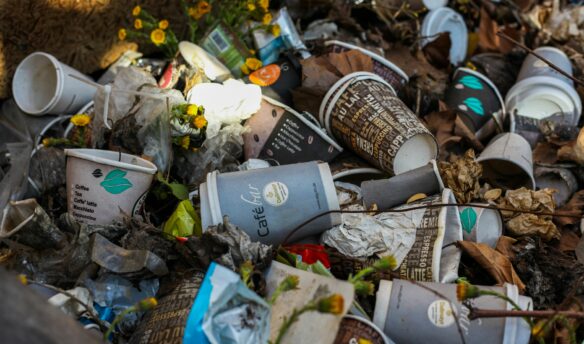Beanless coffee is back—but did it ever really leave? Plus, Snoop Dogg drops his coffee brand like it’s hot and a report illuminates the realities of debt bondage among India’s coffee workers.
‘”We Know the Pain”: Freed India Coffee Workers Lead Way From Bonded Labor’ – via The Guardian
Despite being abolished in 1976, bonded labor—when an individual’s work is demanded to repay a loan owed to their employer—is still rampant in India’s agriculture sector. The Guardian reports there are potentially thousands of families in one of the country’s central coffee-growing regions stuck in debt bondage.
In their article, The Guardian shares the story of one couple stuck in a cycle of low wages and increasing debt to their employer. Ramesh and Nandini had worked at the Cauvery coffee plantation in Kodagu for a decade, earning 100 rupees ($1.20) per 14-hour day while trying to pay off a 25,000 rupee loan. “Each month, they fell deeper into debt as interest rates increased,” the article states. “Meanwhile, they were trapped on the site. Ramesh had to ask for permission to be allowed to make the monthly outing to buy supplies.”
It was on one of these trips that Ramesh had a chance meeting with a relative who brought him Adivasi Hakkugala Samanvaya Samiti (AHSS). The organization comprises former bonded laborers and has helped 1,500 workers leave coffee plantations in Kodagu. AHSS proved that the couple was being exploited and gained a court order to secure their release. “The day of rescue was surreal,” Nandini said. “Members of the AHSS accompanying the police reached us at the plantation and we left the place forever. Freedom looked like an unbelievable gift to life.”
While no longer legal in the country, bonded labor is still widespread in India, according to the International Labour Organization. More than 200,000 people work on plantations in Kodagu, which produces about 35% of India’s annual coffee output, and AHSS estimates over 8,000 families in the district are stuck in bonded labor. Some coffee estates are a “vicious den of debt bondage,” according to YK Ganesh, secretary of AHSS.
Ramesh and Nandini have since returned to their home village, where they work on a smaller coffee farm, earning more than double their previous wage (about 400 rupees, or $4.80, per day). “Having experienced life in bondage made us realize the meaning of dignity of labor with freedom,” Nandini told the Guardian. “Restoring it to the lives of those still suffering is now our sole aim.”
‘Snoop Dogg Drops His ‘Coffee Lifestyle Brand’: Report’ – via Vanity Fair
Six months ago, Snoop Dogg launched a coffee company called INDOxyz to great fanfare. Now, it appears he has parted ways with the Indonesian-focused coffee brand. (It’s worth noting that this information comes via an anonymous source talking to Page Six.)
The musician and entrepreneur partnered with Indonesian coffee entrepreneur Michael Riady for the venture, which was to include whole bean, pre-ground, and ready-to-drink cold brew products sourced from Indonesia. The project’s launch was much hyped: “Indo is going to change the industry, I can promise you that,” Snoop Dogg said in a press release—but the company’s website currently lists just two coffee options alongside a merch range.
According to Page Six, INDOxyz’s president “alerted the board to alleged issues involving Riady’s management.” After a short investigation, “Snoop and his team left the company, dropping all ownership and stake in the company… and they did not offer a reason,” the insider told Page Six. The gossip column also “heard” that the two co-founders disagreed over music choices for marketing the brand. Neither party commented on the story, but it remains “unclear if Riady will continue to operate the brand without Snoop.”
More News
‘GCP and ICO Renew Multi-Stakeholder Sustainability Partnership‘ – via Daily Coffee News
‘Dark Matter Partners with George Clinton and The Black Angels‘ – via Global Coffee Report
’24 Days Of Coffee With Onyx Coffee Lab’s 2023 Advent Calendar’ – via Sprudge
‘Ministry of Agriculture and Qima Coffee Unite to Promote Yemeni Coffee‘ – via Global Coffee Report
‘Coffee Grounds, Tyres and Plastics Part of New Green Steel Technology‘ – via Cosmos Magazine
‘Bean Voyage Hosting Women-Powered Coffee Summit in Costa Rica‘ – via Daily Coffee News
‘New Handbook Serves Robusta Producers in West Africa‘ – via STiR Coffee and Tea
‘Whole Foods Rebrands House Coffee Line, Drops Allegro Name‘ – via Daily Coffee News
‘New Research Reveals What’s Driving UK Cold Brew Coffee Trend‘ – via Global Coffee Report
The Week in Coffee Unionizing
The acclaimed Philadelphia-based Korshak Bagels has closed. Run by “poet-owner” Phil Korshak, the shop was praised by the New York Times, Bon Appetit, and Forbes, gained a loyal social media following, and constantly sold out of bagels due to the high demand. It was also the only business to ratify a contract with its workers as part of the Philly-wide Local 80 cafe unionizing initiative.
After Korshak’s announcement, there was an outpouring of support and well-wishes in articles and on social media. However, according to union organizers, the press coverage also showed a lack of awareness over what the decision meant for the company’s workers. Articles about the store’s closure focused on Korshak himself, one organizer told Billy Penn, “and either ignored workers or implicitly blamed us for the closure because we unionized.”
Korshak Bagels played a crucial role in Local 80’s organizing push. Korshak recognized the proposed union on the spot and even opened the company’s books to his workers. The union, part of the Workers United Philadelphia Joint Board, helped organize several coffee businesses in the city, including Elixr Coffee, Ultimo Coffee Roasters, ReAnimator Coffee Roasters, and, most recently, Vibrant Coffee.
Despite the setback—along with recent news that workers at Good Karma Cafe voted to decertify their union—organizers in the city remain hopeful. “This is a hard hit to see two Local 80 shops fall off,” said Lily Fender, a former Korshak employee who now works for Workers United. “But I think workers are more determined than ever to get what they deserve.”
The Week in Corporate Coffeewashing
“Beanless” coffee is back in the news.
Over the past few years, brands such as Atomo and Minus have received millions in funding to create coffee made from things other than coffee beans. Atomo, the most-hyped and best-funded, released a proof-of-concept “cold brew” in 2021 and will also supply “espresso” to one New York City coffee shop, but this latest media flurry is because the company is finally launching its “coffee” at the New York Coffee Festival.
Much like its cold brew, Atomo says its latest creation—made using recycled ingredients such as date pits—uses significantly less water and creates fewer carbon emissions than regular old coffee grown in the ground. The “molecular” or “lab-grown” coffee companies’ stated goals—noted in the overwhelmingly positive media coverage—are environmental, pointing towards climate change and the deforestation caused by coffee’s expansion.
“Coffee is causing deforestation at a pretty alarming rate – almost up to ten (New York) Central Parks a day,” Atomo’s CEO and co-founder Andy Kleitsch told Reuters. “We’re talking about a machine, a coffee machine that’s never stopping, always looking for more land, and that’s what we’re trying to prevent.”
However, lost in most of this coverage is what will happen to all the farmers who rely on coffee for their income. There are between 12.5 and 25 million coffee farmers worldwide, many of whom live in poverty. What happens to these farmers if Atomo and companies like it aim to replace coffee with their venture capital-fueled, proprietary lab-grown coffee-like substance? They’ll most likely move on to grow something else, which, as Sprudge points out, means “all that deforestation we saved from not growing coffee will now be deforestation from a different cash crop.”
(Buried in its FAQ page, Atomo says, “Our goal is not to displace global coffee or coffee farmers. We are here to present a solution for coffee lovers and their increased demand over time.”)
And for those concerned about the future of coffee and how climate change will affect the industry, the Reuters piece ends with an ominous line. Atomo, it says, is “in talks with most of the world’s major coffee firms about how it might scale up and supply them.” These big companies, Kleitsch said, “all know they have a problem with coffee availability in next 20-30 years, and they’re trying to get ahead of the problem.”
Beyond the Headlines
‘Why Your $7 Latte is $7’ by Emily Stewart
‘Navigating the Buzzwords Behind an ‘Ethical’ Bag of Coffee’ by Spencer M Ross
















